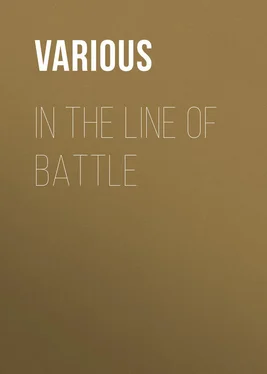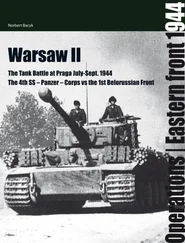Various - In the Line of Battle
Здесь есть возможность читать онлайн «Various - In the Line of Battle» — ознакомительный отрывок электронной книги совершенно бесплатно, а после прочтения отрывка купить полную версию. В некоторых случаях можно слушать аудио, скачать через торрент в формате fb2 и присутствует краткое содержание. Жанр: История, prose_military, Биографии и Мемуары, на английском языке. Описание произведения, (предисловие) а так же отзывы посетителей доступны на портале библиотеки ЛибКат.
- Название:In the Line of Battle
- Автор:
- Жанр:
- Год:неизвестен
- ISBN:нет данных
- Рейтинг книги:4 / 5. Голосов: 1
-
Избранное:Добавить в избранное
- Отзывы:
-
Ваша оценка:
- 80
- 1
- 2
- 3
- 4
- 5
In the Line of Battle: краткое содержание, описание и аннотация
Предлагаем к чтению аннотацию, описание, краткое содержание или предисловие (зависит от того, что написал сам автор книги «In the Line of Battle»). Если вы не нашли необходимую информацию о книге — напишите в комментариях, мы постараемся отыскать её.
In the Line of Battle — читать онлайн ознакомительный отрывок
Ниже представлен текст книги, разбитый по страницам. Система сохранения места последней прочитанной страницы, позволяет с удобством читать онлайн бесплатно книгу «In the Line of Battle», без необходимости каждый раз заново искать на чём Вы остановились. Поставьте закладку, и сможете в любой момент перейти на страницу, на которой закончили чтение.
Интервал:
Закладка:
In such a war and in such a place it is not easy to tell of what was done by individuals, because so many splendid acts are unobserved; but I call to mind the coolness and resource of my own platoon officer, Lieutenant McLeod. He was dashing all over the place, encouraging his men at every point, and doing things all round in fine style. I was talking to him quite a lot in the thick of things, and was specially struck by his calmness and the wonderful effect his example had upon the men.
One outstanding performance of his was to run, in broad daylight, from battalion headquarters to the trenches – a pretty brave achievement, when you bear in mind that a running man presents an almost certain target to snipers.
In this connection, I call to mind the case of a section commander who was in a trench. He wished that a certain thing should be done, and by way of indicating his desire he held up his hand, with palm extended. That must have been a small enough target, in all conscience, but it was no sooner in the air than it was pierced by five German bullets. If a hand can be so effectively fired at, what chance to escape has the body of a man?
This trench warfare was uncommonly exhausting. You never knew what was going to happen, or what you would be called upon to do; but it was astonishing to find how soon you could adapt yourself to circumstances.
I recall an occasion when we had been forced to retire at one point and get into a communication trench; we were taken aback by the discovery that it was not deep enough. We had to dig ourselves in. That was not a hard matter for the boys who had their entrenching-tools, but I had lost mine, and the only thing left to do was to try rabbit tactics. So I began to dig myself in with my fingers, and I have a distinct recollection of tearing and scooping at the ground like an animal scuttling for shelter. Luckily the ground was soft and yielding, or I should not have had a chance with such poor tools. As it was, my fingers were torn and bleeding long before the digging-in process was completed.
I have given you a general understanding of the task that fell to the Canadian Contingent to accomplish; but as I have said, it is not the actual fighting that dwells in one’s memory.
We soon settled down to the ordinary ways of war, and took them as a matter of course. While in training in England we had heard and read a good deal about the fighting, and had become accustomed to it; while as for any such discomforts as heavy rain and sodden ground, they did not trouble us. Not even Flanders could give us worse trials of this sort than we had known while wintering on Salisbury Plain.
The boys took the fighting and the hardships as part of the day’s work, and there was neither grumbling nor protesting; but that state of things was changed like magic when there was sprung upon us the most cowardly, dastardly, and dirty means of fighting that the world has ever known. This was the use of poison-gas by the Germans – a device which instantly put them out of consideration as civilised combatants, and stamped them for ever as dishonourable soldiers of a dishonoured country.
This poison-gas came upon us unseen, insidiously, and without the slightest warning in the one case; and in the other it rolled down upon us literally as a cloud.
It is hard to speak calmly of this unprecedented form of warfare, but I will try to tell exactly what happened, and I think I can do that, because when I was a medical student I particularly interested myself in chemistry.
It was on Saturday, the 24th, that our Brigade had their first experience of gas. We had been shelling the German trenches all day, and were standing to, expecting an attack by the enemy. We naturally looked for the employment of the usual methods, and were ready to receive the Germans when they showed themselves. We were strongly entrenched, and many a keen eye was kept on the hostile ground, watching for the appearance of the enemy. But not a sight of a German was to be had; there was no commotion, no excitement, no appearance of anything uncanny or uncommon, yet there was coming towards us a German weapon which was neither honest artillery nor small arms – poison-gas.
There was nothing to be seen in the air, yet suddenly, and without any apparent cause, we were overpowered by a smell exactly like nasturtium, but infinitely stronger and more pungent. The similarity noticed is remarkable, for doesn’t nasturtium come from Latin words which really mean a nose-twister? Anyway, there we were in our trenches, unexpectedly overpowered by a horrible acrid smell and an invisible gas.
A lot of the boys – fine, splendid, honest fellows, who did not understand the meaning of any kind of warfare that is not honourable and aboveboard, were utterly unable to fathom the mystery, and they seemed to think that it was the kind of pest that had to be taken with the other discomforts of campaigning in the Low Country.
“What the deuce is it?” they asked.
It was not until the whole unspeakable visitation was over that most of the men realised what had happened, and that the Germans had tried to blind us as a preliminary to annihilation. Like so many more of the German hopes, this did not develop on the lines that had been planned.
This was the first poison-gas attack that we experienced, and I am thankful to say that on the whole it was a failure; but when you remember that we were utterly unready for such a filthy form of fighting, and that we had no means of combating it or nullifying its effects, you will realise the extreme disadvantage of the contest from the point of view of the Canadians.
I have said that it was about four o’clock in the afternoon when we had our first experience of the poison-gas. Now that I am talking of the thing it strikes me as a strange coincidence that it was at about four o’clock in the morning when we had our second visitation.
We had got into our stride and settled down to hard hammering and what you might call routine campaigning. Then came the morning of Saturday, April 24th, when the sun rose ten minutes before five o’clock, which means that at about four o’clock day was breaking.
Most of us were asleep; but in war time there is no such thing as universal rest for men, and our sentries were posted and keeping watchful eyes upon the German lines. It is said that the darkest hour comes just before the dawn, and I think there is no doubt that man’s lowest vitality is reached at that particular period. At any rate, the Germans probably thought so, for they planned a specially fatal attack upon us in the grey hours of this April morning.
While looking round in the cheerless dawn one or two of our sentries saw a yellowish kind of cloud coming towards us, over the hogback, and travelling pretty fast. The sight was unusual enough to be noticed, but no one who saw it had the slightest idea what it really was, until we were enveloped in the filthy folds; then we knew that it was poison-gas.
The cloud rolled on, and as it got quite close to us I noticed that it was about eight feet or twelve feet high, a deep, dense yellow at the bottom, and becoming lighter towards the top, so diffuse, indeed, that it was almost indistinguishable from the atmosphere. It is not easy exactly to convey an understanding of what the cloud really was, because few men have ever seen anything like it; but it might well be described as a moving mass of yellow, fat filth, insufferably loathsome. The poison-gas, the chief constituent of which I took to be chlorine, was about twice as heavy as air, and, consequently, it travelled along the surface of the ground.
I saw the yellow cloud come, I watched it as it enveloped us, and I observed it as it rolled away behind us and went towards Ypres, gradually losing force as it was absorbed in the air. In addition to being so favourably situated, we had just had a rum ration – and plenty of it. I do not know whether the spirit did us any good, but it certainly did not do us the least harm, and may have helped to nullify the effects of the poison-gas.
Читать дальшеИнтервал:
Закладка:
Похожие книги на «In the Line of Battle»
Представляем Вашему вниманию похожие книги на «In the Line of Battle» списком для выбора. Мы отобрали схожую по названию и смыслу литературу в надежде предоставить читателям больше вариантов отыскать новые, интересные, ещё непрочитанные произведения.
Обсуждение, отзывы о книге «In the Line of Battle» и просто собственные мнения читателей. Оставьте ваши комментарии, напишите, что Вы думаете о произведении, его смысле или главных героях. Укажите что конкретно понравилось, а что нет, и почему Вы так считаете.












